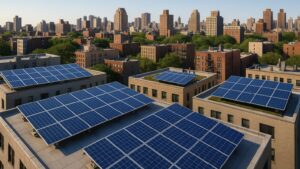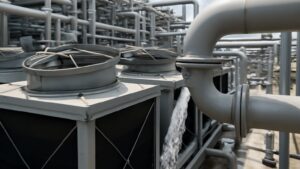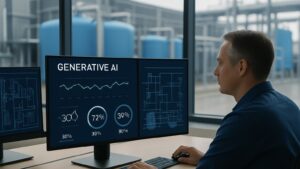Climate change is one of the most pressing issues of our time, with its devastating effects being felt across the world. The Middle East, in particular, is highly vulnerable to the impacts of climate change, which include rising sea levels, water scarcity, extreme temperatures, and food insecurity. However, while climate change presents significant challenges for the region, it also provides an opportunity for innovation and technological advancement.
In recent years, the use of technology has become increasingly important in addressing the effects of climate change, and the Middle East is no exception. From solar energy to water conservation, new technologies are being developed to tackle the unique challenges of the region. But can technology really save the Middle East from the worst effects of climate change? In this blog post, we will explore the potential of technology to mitigate the impact of climate change in the Middle East and the challenges that still need to be addressed to make this a reality.
Why is a climate plan vital for the Middle East?
The Middle East is one of the regions most vulnerable to the impacts of climate change. Its arid climate and reliance on water-intensive industries like agriculture and oil production make it particularly susceptible to droughts and water scarcity. Additionally, the region has some of the fastest-growing populations in the world, which puts further strain on its already limited resources. However, the region is also home to some of the world’s most innovative technologies and has the potential to lead the way in the fight against climate change.
Renewable energy solutions
One of the most promising technologies in the Middle East’s fight against climate change is solar power. The region has some of the highest levels of solar radiation in the world, and several countries are investing heavily in solar energy as a way to reduce their carbon footprint and meet their growing energy needs. Another technology that could help the Middle East adapt to the impacts of climate change is desalination. With water scarcity being a significant issue in the region, several countries have invested in desalination plants to produce freshwater from the ocean.
Other alternatives
While the Middle East has made significant strides in adopting clean technologies, there are still several challenges that need to be addressed. One of the most significant challenges is the high cost of renewable energy compared to traditional fossil fuel sources. This cost differential can make it difficult for countries to transition to a clean energy economy, especially when economic growth is a priority. Additionally, while solar and wind power are abundant in the region, they are not always reliable sources of energy, and the storage technology needed to provide consistent power is still in its early stages of development.
Conclusions
In conclusion, technology can play a vital role in saving the Middle East from the worst impacts of climate change. The region’s unique challenges require innovative solutions, and solar power, desalination, and other clean technologies offer hope for a more sustainable future. However, realizing this potential requires overcoming significant challenges, such as cost-effectiveness and reliability. It also requires cooperation between governments, the private sector, and civil society. By prioritizing investment in research and development, and by developing policies that support clean energy and sustainable development, the Middle East can become a leader in the global fight against climate change. Ultimately, the success of the region’s efforts to address climate change will have significant implications for the world’s ability to confront this existential threat.
The Global Summit on Scope 3 Emissions Reduction will bring together key industry experts to learn more about reporting strategies & carbon data management in a small-scale, industry-driven event, on 20-21st April 2023 in Amsterdam, the Netherlands. The two-day, hybrid event features in-depth case studies of supply chain transformation, carbon accounting, and networking breaks dedicated to exchanging insights and expertise on tackling Scope 3 emissions. Visit future-bridge.eu and netzero-events.com or follow us on our social media to track other energy use and decarbonization events.





